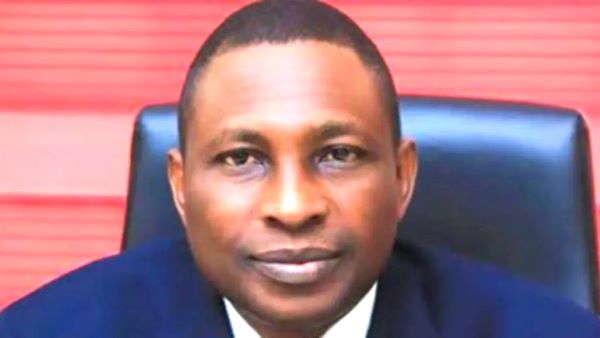The Economic and Financial Crimes Commission (EFCC) on Thursday arraigned another 20 foreign nationals before the Federal High Court sitting in Lagos for alleged cybercrime and attempts to destabilize Nigeria’s social and economic structure.
The defendants, 15 Filipinos, one Indonesian and four Chinese nationals were arraigned before Justice Musa Kakaki.
They are part of the larger 193 foreign nationals arrested in December 2024, alongside 599 Nigerians in a surprise operation at their hideout, Big Leaf Building in Victoria Island, Lagos, following credible intelligence gathered by the anti-graft agency.
At the arraignment, counsel to the EFCC, Nwandu Ukoha, asked that the charges against the defendants be read so that they could take their plea.
Through an interpreter, the charge was read and all the defendants in their separate counts pleaded not guilty.
Ukoha also asked the court to remand the defendants in the custody of the Nigeria Correctional Service, pending trial.
Lawyers representing the defendants, Bridget Omoteno and BA Ukpai, however, opposed him. They asked the court for a short adjournment to enable the defendants explore the possibility of a plea bargain with the prosecution.
After listening to the parties, Justice Kakaki granted the prosecutor’s request and remanded the defendants in the custody of the Nigerian Correctional Services’ pending trial. The court adjourned to March 18th and 20th for possible trial.
Some of the foreigners arraigned are; Kayceelyn Remorin, Jonylyn Agulto, Donny Hermanto, Guo Bin, Darwa Esmael, Lari Jane Tayac, Jhena Samiento, Jessa Sai Chui, Rain Torida, Kimbaley Nisperos, Winnie De Jesus, Shairah May Reyes, Gladys Joy May Iba, Jean Calaga, Huo Wen Jie, Zhao Sui Tao, Gong An Penguna Yua and Anjeannet Topacio.
The two-count charge against the defendants alleges that they and GENTING INTERNATIONAL CO. LIMITED on or about the 18th of December 2024 in Lagos within the jurisdiction of the Honourable Court willfully caused to be accessed, computer systems organised to seriously destabilise the economic and social structure of Nigeria (which prohibits and prevents cyber and related crimes) when they procured/employed Nigerian youths for identity theft and to hold themselves out as persons of foreign nationality, with the intent to gain financial advantage for themselves and thereby committed an offence contrary to and punishable under Section 18 and 27 of the Cybercrimes (Prohibition, Prevention, Etc) Act, 2015 (As Amended, 2024).”
The defendants were also alleged to have sometime in December 2024 in Lagos within the jurisdiction of this Honourable Court, with the intent to gain financial advantage for their employer fraudulently impersonated and hold themselves out as such, and thereby committed an offence contrary to and punishable under Section 22(2)(b) and 27(1)(a) of the Cybercrimes (Prohibition, Prevention, etc) Act, 2015.
Channels TV


